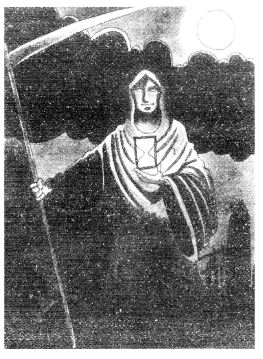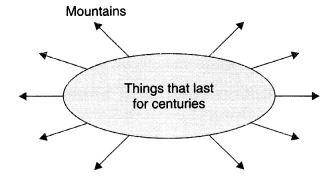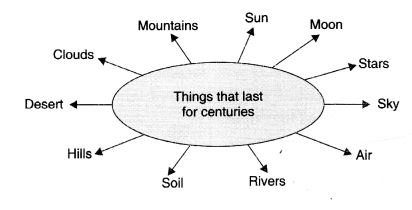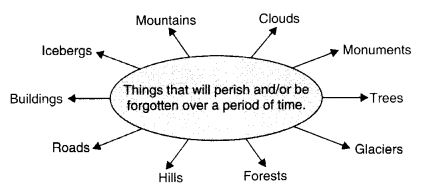Question 1.
Look at the following picture carefully.
(a) What has Time been portrayed as? Why?
(b) What are the other symbols associated with Time?
(a) Time has been portrayed as a mysterious man wearing a loose cloak with a scythe in one hand and an hour-glass in other. Time is shown to have been fleeting fast. Time is the greatest conqueror.
(b) Tides, bubble of water, wind, sand, money, etc.
Question 2.
(a) What are the things that last for centuries ? List a few things around you that will survive four to five hundred years into the future.

(b) Think of things that will perish and/or be forgotten with the passage of time.
Question 3.
On the basis of your understanding of Shakespeare’s sonnet, answer the following questions by ticking the correct options.
(a) The rich and powerful got ornate monuments made in order to _____
(i) show off their wealth
(ii) display their power
(iii) show their artistic talent
(iv) be remembered till posterity.
(b) The poet addresses his sonnet to _____
(i) time
(ii) war
(iii) the person he loves
(iv) powerful rulers.
(c) The poet’s tone in the poem is _____
(i) despairing
(ii) optimistic
(iii) loving
(iv) admiring,
(e) The poem is set in _____
(i) the place where the poet meets his friend
(ii) a battlefield where Mars is fighting a battle
(iii) a city ravaged by war
(iv) the poet’s study where he is writing.
(iv) be remembered till posterity.
(iii) the person he loves
(iv) admiring,
(iv) the poet’s study where he is writing.
Question 4.
Answer the following questions briefly.
(a) Why do you think the rich and powerful people get monuments and statues erected in their memory?
(b) Describe how the monuments and statues brave the ravages of time.
(c) Why does the poet refer to Time as being sluttish?
(d) The poet says that neither forces of nature nor wars can destroy his poetry. In fact, even godly powers of Mars will not have a devastating effect on his rhyme. What quality of the poet is revealed through these lines?
(a) Rich and powerful believe that by erecting statues and monuments people will remember them even after their death. They do not realise that people will remember them for their deeds and not for huge structures. It is their pride and ego which makes them do all this.
(b) Monuments and statues remade of stone and cement which are strong and structures constructed with these can stay for centuries. They can withstand extreme weather conditions such as rain, storm, severe heat, etc.
(c) Time has been referred to as ‘sluttish’ because time waits for no one. It passes by. We have to learn to value time. Time treats everyone in the same way. It does not treat a rich and poor man differently. “Sluttish” can also mean whorish as time cares for no individual; it is immoral and will finally pass. The grand memorials will become eroded, and the people memorialised will eventually be forgotten.
(d) The poet says that neither forces of nature nor wars can destroy his poetry. In fact, even godly powers of Mars will not have a devastating effect on his rhyme. What quality of the poet is revealed through these lines?
Question 5.
Shakespeare’s sonnet has been divided into three quatrains of 4 lines each followed by a rhyming couplet. Each quatrain is a unit of meaning. Read the poem carefully and complete the following table on the structure of the poem.
| Rhyme | scheme | Theme |
| Quatrain 1 | Comparison between poetry and monuments. | |
| Quatrain 2 | Ravages of time on monuments contrasted with | |
| Quatrain 3 | The recorded memorv of posteritv | |
| Couplet | Poetry immortalises friend |
Rhyme SchemeThemeQuatrain 1a, b, ab Quatrain 2cd cdthe living record of the memory of poet’s friend.Quatrain 3ef efthe poet’s friend will be remembered and praised till posterityCompletgg–
Question 6.
(a) The poet uses alliteration to heighten the musical quality of the sonnet. Working in pairs* underline the examples of alliteration in the poem.
(b) Identify Shakespeare’s use of personification in the poem.
(a) Examples of alliteration
- When wasteful war shall statues overturn
- Not marble, nor the glided monuments
- But you shall shine more bright in these contents.
- Even in the eyes of all posterity
- That wear this world out to the ending doom.
(b) Use of personification
- When wasteful war shall statues
- And broils root out the work of masonry.
- Here war and broils are shown to have powerful hands that are capable of causing destruction.
- Your praise shall still find room.

